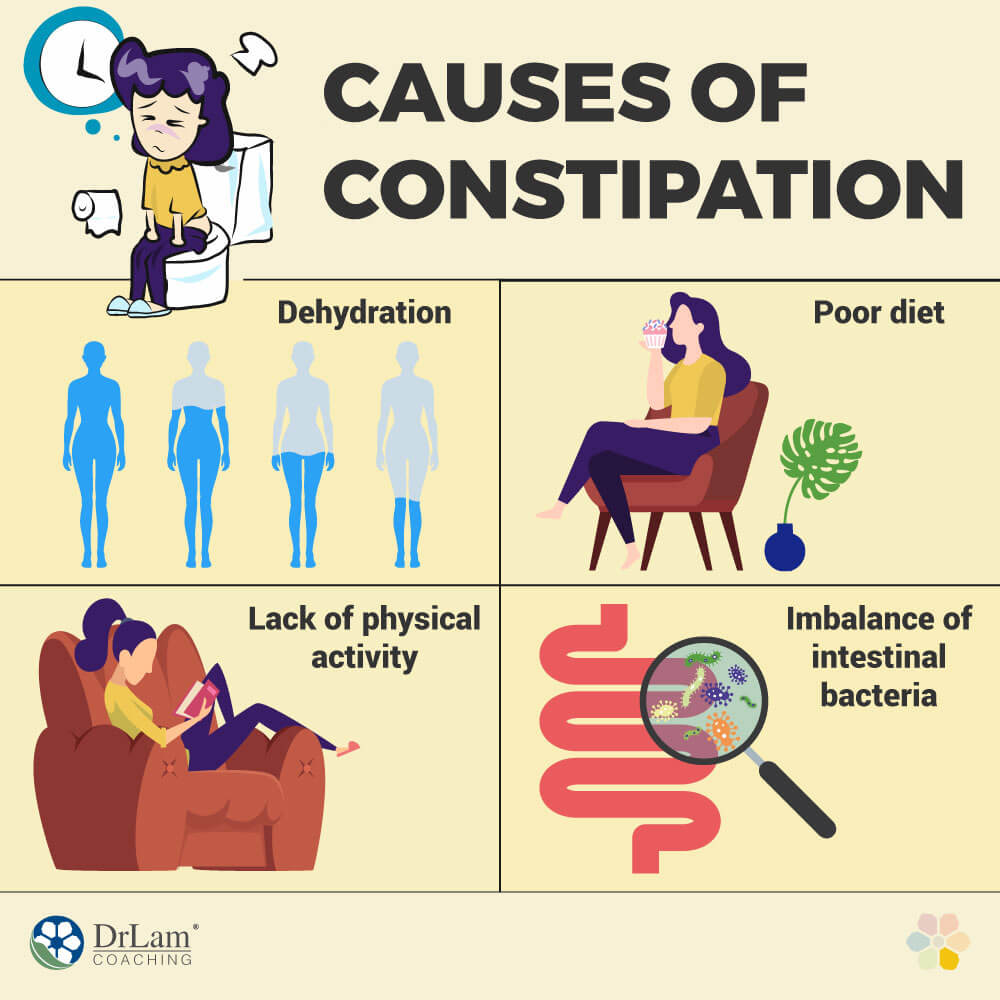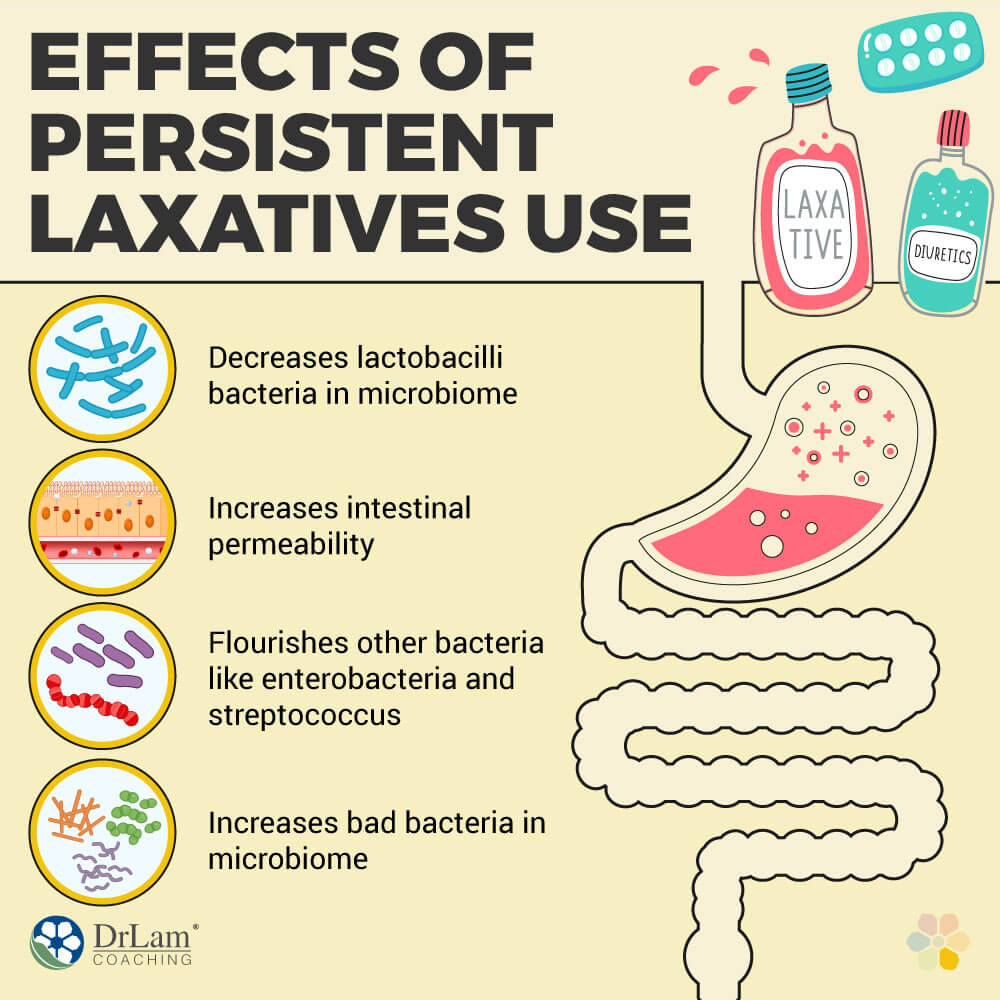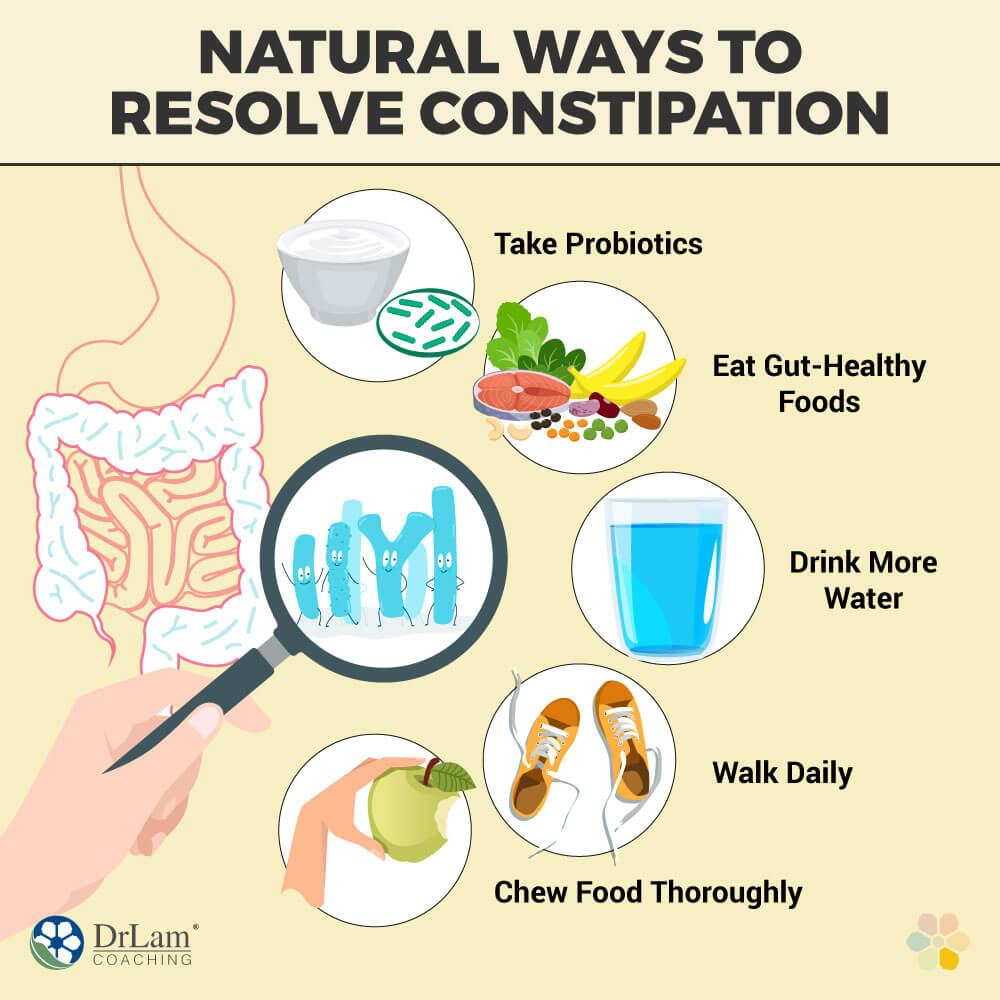You probably don't often talk about the importance of healthy, regular bowel movements. In fact, many people who suffer from problems in this area keep it to themselves because of embarrassment. And that’s a problem because having regular bowel movements is absolutely essential for your long-term and short-term health. If you struggle with this, then you might try solutions such as laxatives, which can give short-term relief. However, recent research is now illuminating the unhealthy ways that laxatives affect the microbiome. This short-term solution may have long-term consequences for this system and your overall health.

Constipation is a common problem. It can occur because of dehydration, a poor diet, or lack of physical activity. Gut bacteria imbalances, or dysbiosis, can also cause constipation. When your body loses the natural balance between different kinds of gut bacteria, it can cause an increase in the wrong kinds of bacteria which has negative effects on gut and intestine function. Constipation can be a natural result of this.
Laxatives are fast-acting remedies for constipation. There are several different types of laxatives and each reduces or alleviates constipation in a different way. The most common types of laxatives are:
If you regularly suffer from the pain and discomfort of constipation, then these might seem like the ideal solution. However, each of these remedies has potential side effects, including the ways that laxatives affect the microbiome.
The microbiome is basically the balance of bacteria in your body. There are billions of these bacteria, and they have vital roles in digestion, elimination, and other functions in the body. When the healthy balance of these bacteria is lost, it can result in a range of diseases and disorders including:
This is why it is important to consider the negative ways that laxatives affect the microbiome before you try this remedy.
 When your gut is unhealthy and the microbiome unbalanced, it can cause serious problems for your body. Poor gut health is a source of stress. It can cause diarrhea, constipation, poor absorption of nutrients, impaired mental health and balance, and leaky gut. All of these problems will increase your stress levels and can bring on or exacerbate AFS.
When your gut is unhealthy and the microbiome unbalanced, it can cause serious problems for your body. Poor gut health is a source of stress. It can cause diarrhea, constipation, poor absorption of nutrients, impaired mental health and balance, and leaky gut. All of these problems will increase your stress levels and can bring on or exacerbate AFS.
The NeuroEndoMetabolic (NEM) Stress Response is how your body deals with short-term sources of stress such as a physical threat. However, it isn’t designed to be active all the time. If you’re stressed because of your lifestyle and have poor gut health as well, then it may push the NEM stress response past the point where it can continue doing its essential duties.
The adrenal glands are a vital part of the NEM stress response and excrete the stress hormone cortisol. When your NEM stress response becomes overused, the adrenals are usually the first place this strain starts to show. They can begin to struggle to produce the necessary amount of cortisol, resulting in imbalances throughout the body because of the interconnectedness of the human body’s circuits. If you don't correct this situation, the adrenals can even start to breakdown, which can cause even more severe problems and dysfunctions.
The microbiome is one part of the Inflammation circuit, one of the six circuits that are affected by the NEM stress response. The other two parts of the circuit are the gut and the immune system.
The Inflammation circuit is essential to your body’s protection and repair. In most situations, when your body is under threat, the immune system activates to increase inflammation levels. When your body rids itself of the threat, the inflammation recedes.
However, when your Inflammation circuit is unbalanced, you will have an overactive immune system, rampant inflammation, imbalances in the microbiome, and gut problems. These components are all deeply connected, so as the health of one declines, it will affect the functioning of the others. And this will increase your stress levels and worsen AFS. For many people who have AFS, this can result in a range of diseases such as metabolic syndrome and diabetes as well as troubling symptoms like bloating, brain fog, anxiety, or depression.
Recent studies have highlighted the negative ways that laxatives affect the microbiome. One study examined the way that polyethylene glycol affected the microbiota of mice. Polyethylene glycol is a component of many over the counter osmotic laxatives including MiraLax. It works by drawing water into the colon to soften the stool.
The researchers at the Stanford University School of Medicine in California gave this laxative to mice for six days. This caused diarrhea that lasted a short time but had long term effects on the composition of the microbiome. It allowed certain microbes to flourish and hampered the growth of other common microbes that are essential to good health.
A microbial family known as S24-7 went nearly extinct. These microbes are exclusive to warm-blooded animals and help to ferment carbohydrates. Even more importantly, these microbes did not recover after the treatment period, though they could be reintroduced into the system after the treatment was completed. After the study, the mice were found to have less diverse gut bacteria overall. And this is a problem because gut microbiome diversity is essential to bowel health. And when this diversity is reduced, it can lead to issues like Crohn’s disease.
The laxatives also had an effect on the immune system. It caused a thinning of the mucus that protects the gut lining and took time to recover. The shape of the cells in the gut lining also changed and only reverted after the experiment was complete. Because of the link between the gut lining and immune response, this indicates that the immune system was activated in response to the laxatives. And because the immune response to the microbes persisted after the laxative recovery, there is now evidence that laxatives affect on the microbiome may persist over the long-term.

Similar results have also been found in humans. A recent study examined changes in the microbiota after a pre-colonoscopy enema. The researchers found:
If you have AFS, then the ways that laxatives affect the microbiome could have even more negative effects on your overall health. People with AFS often suffer from constipation, which may necessitate the use of laxatives. However, the after-effects will only complicate the problem further.
The Inflammation circuit often declines in health due to AFS which can cause poor elimination, an increase in gut permeability, imbalances in the microbiome, and constipation. Taking laxatives will worsen all of these problems or increase the chances of experiencing them regularly. As the microbiota goes out of balance, it in turn worsens imbalances in the Inflammation circuit. Gut health declines and immune system activation increases, both of which will further affect the microbiome imbalance throughout your body. This also causes stress, prompting the release of more cortisol from your adrenal glands and worsening your AFS overall.
This is why it’s so important to find gentler and more effective strategies if you suffer from constipation. It pays long-term dividends to try solutions that support your natural gut balance before any harsher remedies. And, if you must take laxatives, it is vital to take steps to support your microbiome at the same time.

If you must take laxatives to alleviate constipation but are concerned about the ways that laxatives affect the microbiome, there are steps you can take to protect your gut. There are several strategies that can help with this including:
Taking probiotics that contain Lactobacilli cultures will help to support a natural gut bacteria balance. Lactobacilli are bacteria that are found naturally in your gut and will work in harmony with other families of bacteria to achieve a natural balance.
You can also reduce the ways that laxatives affect the microbiome by including more gut-healthy foods in your diet. These foods will help encourage a natural balance of good bacteria in your body. Some helpful foods include:
A diet that’s high in whole grains, vegetables, and fruits will also help improve AFS. A poor diet is a common cause of AFS as it can lead to a range of health disorders and inadequate nutrition. Alleviating this problem with a healthy, balanced diet will go a long way towards correcting this cause of stress and putting you on the road to health.
Dehydration is a common cause of constipation as it dries out the stool and the lubricant needed to allow for easy evacuation. So, if you take laxatives, make sure that you increase your water intake to at least a liter and a half of water every day.
Exercising regularly will help to get your intestines moving and promote healthy bowel movements, so try to go for a walk each day or do some other form of exercise. However, if you have AFS, then you will need to be careful when adopting this strategy. Even gentle exercise can be too much for an overtaxed body in the grips of severe AFS. So, before you adopt this strategy, make sure you talk to a medical professional who’s aware of your condition to learn the safest ways to adopt this tactic.
Many people rush through their meals, chewing just enough to get the food down. This is not good for your stomach or your gut. Slowing down and chewing your food thoroughly can improve nutrient absorption and speed up your bowel movements, so take the time to chew and really enjoy your food.
 Irregular bowel movements can be very uncomfortable and even dangerous. However, that doesn’t mean that you should immediately turn to strong solutions such as laxatives. Considering the negative ways that laxatives affect the microbiome, your health might be better in the long-term if you try more natural solutions first. If you struggle with irregular bowel movements, here’s what to try:
Irregular bowel movements can be very uncomfortable and even dangerous. However, that doesn’t mean that you should immediately turn to strong solutions such as laxatives. Considering the negative ways that laxatives affect the microbiome, your health might be better in the long-term if you try more natural solutions first. If you struggle with irregular bowel movements, here’s what to try:
If you need help improving elimination or with the health of your gut or microbiome, then click here to use the Ask A Doctor System. Or you can give our team a call on (626) 571 1234.
© Copyright 2021 Michael Lam, M.D. All Rights Reserved.
People have used laxatives for years to alleviate bowel irregularity and other related issues. However, recent research now suggests that laxatives affect the microbiome in a negative and long-term way. This means you should try more natural, gentle solutions before turning to these harsh medications.
